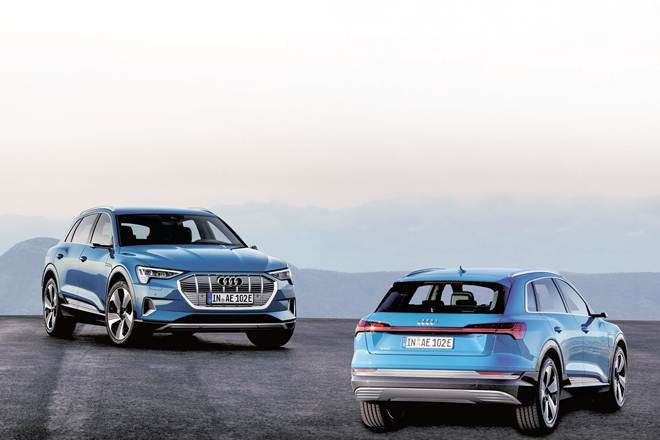In November 2019, Audi India will become the first premium car company to launch a battery electric vehicle in the country. Called the e-tron, this electric SUV is the first fully electrically-powered series production model from the German brand. The company launched it globally last year in San Francisco. This sporty full-size SUV carries a lot of design elements from conventional Audi SUVs, including an expressive sill area and the light grey Singleframe grille. At 4.9 metres in length, it’s slightly smaller than the Q7, but bigger than the Q5. It has a 2.9-metre wheelbase and 660 litres of luggage space.
It will be imported into India as a CBU (completely built-up) unit from the company’s plant in Brussels, Belgium, and so will attract high taxes, which include about 100% import duty, 12% GST that is levied on electric cars, multiple cesses, and registration tax of about 10% depending on the state government. Considering that it’s currently priced 79,900 euros in Germany, which is about Rs 63 lakh at current exchange rates, the price in India could go upwards of Rs 1.2 crore. Yet the company is hopeful of selling decent numbers. “We expect to sell 200 units in India by the end of calendar year 2020,” says Rahil Ansari, head, Audi India.
Powered by two electric motors, the e-tron produces maximum output of 300kW (equivalent to 402bhp for a petrol/diesel car) and 664Nm of torque—these numbers are significantly higher than that produced by any Audi petrol or diesel SUV. Despite its heavy weight (the e-tron weighs about 2.5 tonnes; its battery itself weighs 700kg), it’s as fast as a sports car—it can sprint from 0-100kph in about six seconds and the top speed is electronically limited to 200kph. On a full charge, the e-tron can travel more than 400km (according to WLTP, or Worldwide Harmonised Light Vehicle Test Procedure, a laboratory test).
“For such cars, we expect most movements will happen most likely within the city, so a range of 400km is more than enough for a few days of driving,” says Ansari. “And for those occasional intercity trips, we have a solution. When you travel from, say, Delhi to Chandigarh, our Karnal dealer will allow you the option to charge the car. Similarly, if you travel from Mumbai to Pune, the Pune dealer will likely have a charging point. In addition, we will get home installation done for the customer for overnight charging (11kW charging point).”
While the dealer will have to make investment into his own charging infrastructure, the company will not force any of the dealers to install a plug. Home installation will come at a cost, which the company will announce in some time. In addition, India will most likely get the fully-loaded e-tron. “The expectations of Indian customers are such that when they are paying so much for a car, the car shouldn’t have any feature lacking,” says Ansari.
He adds that the customer profile is such that they are mostly corporates or industrialists, and so in their offices/factories they might have plugs that can support charging up to 22kW (which is close to a fast charger).
While the e-tron has a claimed range of about 400km, in certain conditions it can travel longer, too. This is primarily due to its recuperation system—it can recover energy in two ways: by means of coasting recuperation when the driver releases the accelerator, or by means of braking recuperation when the brake pedal is depressed. In both cases, the electric motors function as a generator and convert the kinetic energy of the vehicle into electric energy, which then gets stored in the 95kWh battery. For example, if you are travelling downhill (say, from the Ghat section towards Mumbai), you can end up gaining range rather than losing it.
Audi India has been working behind the scenes on electric mobility since 2017, when it started a project called Electrified India—a taskforce that has been training company employees on electric vehicles. “Dealers need wiring and charging stations, and soon we will start training personnel at dealerships on servicing and safety aspects etc,” adds Ansari. Globally, for the e-tron, the servicing cycle for customers is 30,000km (compared to about 10,000km for petrol/diesel cars), and servicing costs are also comparatively lower, because electric cars have far lesser moving parts.
It will be offered in India in a choice of 10 colours, and four options for cabin shades (black, grey, beige and brown). Also on offer will be Audi Exclusive—the personal customisation feature. Going forward, the company might launch more electric cars in India. It has announced that, by 2025, it will offer 12 vehicles with all-electric drive in ‘important’ markets.


